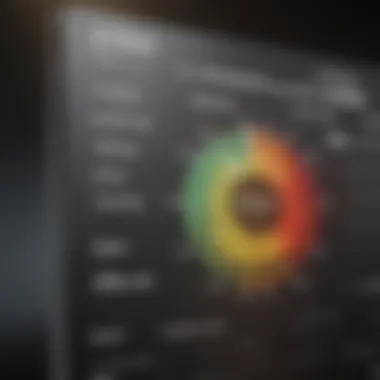Understanding Credit Scores for Camper Financing


Intro
A credit score plays a crucial role in the financing process for significant purchases, such as a camper. Overall, these scores determine the likelihood of receiving a loan and the terms attached to that loan. For buyers eager to embark on adventures with a camper, understanding credit scores can significantly influence their purchasing journey.
Credit scores are numeric representations of an individual's credit history. Various aspects shape these scores, including payment history, credit utilization, length of credit history, types of credit, and recent inquiries. Therefore, individuals considering a camper should familiarize themselves with these factors to navigate the financing landscape successfully.
This examination will shed light on crucial elements relevant to credit scores that buyers must understand before making a camper purchase. Such knowledge will not only clarify the necessary requirements for financing but also highlight strategies for enhancing one’s credit standing.
Prologue to Credit Scores
Credit scores play a critical role in the financial aspects of purchasing a camper. Understanding the concept of credit scores is essential for anyone considering this investment. Credit scores summarize an individual’s creditworthiness based on various financial behaviors. A well-informed buyer can navigate the nuances of camper financing with greater ease.
Definition of a Credit Score
A credit score is a numerical representation of an individual's credit risk. It is derived from the information found in credit reports, which cover an individual's borrowing history, including payment habits, debt amount, and types of credit accounts. Credit scoring models, like FICO and VantageScore, calculate this score using specific algorithms. The scores typically range from 300 to 850, with higher scores indicating lower risk to lenders.
Importance of Credit Scores
The importance of credit scores cannot be overstated, especially when it comes to making significant purchases like a camper.
- Loan Approval: Lenders use credit scores as a primary factor when determining whether to approve a loan. A higher score increases the likelihood of getting approved for financing.
- Interest Rates: Individuals with better credit scores generally qualify for lower interest rates. This can save buyers significant money over the life of the loan, making it a vital consideration.
- Negotiation Power: A strong credit score can provide leverage in negotiating terms with lenders. Buyers can secure better deals or more favorable repayment options, which is crucial for managing future financial responsibilities.
Understanding credit scores, therefore, is not just about numbers; it has real financial implications that influence the overall camper-buying experience. As this article progresses, readers will gain insights into the specific requirements lenders have concerning credit scores for campers and tips on how to improve these scores.
Types of Credit Scores
Understanding the types of credit scores is essential for making informed financial decisions, especially when it comes to big purchases such as a camper. Different scoring models provide insights into the borrower's creditworthiness and can affect the financial options available.
Credit scores serve a similar purpose, but they are derived from various algorithms. Usually, this can create challenges in comprehending how each score might impact loan applications or interest rates. Knowing these differences is vital to grasp what lenders might see when reviewing your financial profile.
FICO Score Overview
The FICO score is one of the most well-known credit scores used by lenders. Developed by the Fair Isaac Corporation, this score typically ranges from 300 to 850. A higher score indicates better creditworthiness. In general, FICO scores play a significant role in most lending decisions.
Several factors influence the FICO score, including:
- Payment history (35%)
- Credit utilization (30%)
- Length of credit history (15%)
- Types of credit accounts (10%)
- New credit inquiries (10%)
Understanding your FICO score is crucial for securing reasonable loan terms and interest rates when buying a camper. Lenders often set their minimum thresholds based on these scores, which means that borrowers should aim for a score above 700 to secure favorable financing.
VantageScore Overview
VantageScore is another credit scoring model, created by the three major credit bureaus: Experian, TransUnion, and Equifax. Similar to the FICO score, VantageScore also ranges from 300 to 850. However, it can differ in how it is calculated and what weight is given to different factors.
For VantageScore, the components that influence the score include:
- Payment history (40%)
- Available credit (20%)
- Credit mix (10%)
- Depth of credit (30%)
- New account inquiries (10%)
One of VantageScore's advantages is its ability to score individuals with less extensive credit histories. This can be beneficial for first-time buyers who may lack a robust credit profile yet still wish to finance a camper. Lenders might use VantageScore for individuals deemed "credit invisible" by traditional methods, allowing them a path to secure financing.
Understanding these two primary credit scores—FICO and VantageScore—empowers potential camper buyers. By being aware of how each score functions and what affects them, you can navigate the loan application process with more ease and knowledge.


Credit Score Ranges
Understanding credit score ranges is crucial when considering a camper purchase. Credit scores can shape the financing options available to a buyer. Those with a higher score are likely to receive better terms on loans, which can lead to significant savings over time. Each credit score category indicates the level of risk a lender associates with a borrower. Therefore, knowing where one stands in these ranges helps in planning an effective approach to financing a camper.
Excellent Credit
An excellent credit score typically falls between 780 and 850. Individuals in this range are the most attractive to lenders. They often get access to the best interest rates available. This can mean thousands of dollars saved over the life of a loan. With an excellent score, you might qualify for lower down payment options and even better loan terms. Lenders perceive borrowers in this category as very low risk, making them a priority for favorable lending conditions.
Good Credit
Good credit scores range from 700 to 779. This range still offers numerous benefits. Borrowers here can still access competitive interest rates and favorable loan terms. The options available may not be as expansive as those for individuals with excellent credit, however, they still provide a solid advantage in securing a camper loan. A good score indicates responsible credit behavior, which most lenders will look favorably upon when making lending decisions.
Fair Credit
Fair credit scores fall between 580 and 699. While still a viable category, borrowers in this range may face fewer options and potentially higher interest rates. Lenders may view these applicants as moderate risk. Consequently, it is wise for borrowers with fair credit to shop around before settling on a lender. Being prepared with a larger down payment can also improve chances for better rates, as it demonstrates commitment and reduces lender risk.
Poor Credit
Poor credit scores are those below 580. This category presents the most challenges when seeking financing for a camper. Borrowers here are considered high risk, leading to higher interest rates or even loan denial. It is crucial for individuals in this range to work on improving their score before applying for loans. Although options may be limited, some lenders specialize in financing for individuals with poor credit, albeit at a higher cost.
"Knowing your credit score range is essential. It helps you understand what lenders see and what offers you might expect."
In summary, understanding where you fall within these credit score ranges can significantly impact your ability to finance a camper. Each score range carries its own set of opportunities and challenges, and being informed allows for better financial decisions.
Credit Scores and Camper Financing
Understanding the relationship between credit scores and camper financing is essential for anyone considering purchasing a camper. Credit scores serve as indicators of financial trustworthiness, influencing the terms and conditions of any financing options available. Lenders typically view these scores as a measure of risk. Therefore, a higher credit score can lead to more favorable terms such as lower interest rates and better repayment conditions. Conversely, a lower score can limit options and increase the cost of borrowing.
It is crucial for prospective buyers to know that each lender may have different criteria regarding credit scores. This variability can affect not only the approval rate but also the overall cost of purchasing a camper. For example, individuals with a solid understanding of their credit profile may be better positioned to negotiate terms with lenders, resulting in potential savings.
Minimum Credit Score Required
The minimum credit score required for financing a camper can vary widely based on the lending institution and the type of loan. Generally, most lenders require a minimum score between 620 and 640 for unsecured loans. However, certain lenders specializing in recreational vehicle loans may offer financing options for those with scores as low as 580. It is important to confirm the specific requirements of each lender because they assess risk differently.
A credit score below the minimum threshold can lead to automatic denials or heavy financial repercussions in the form of higher interest rates. For instance, if a potential buyer is considering a $30,000 camper, a strong credit score could end up saving thousands in interest over the life of the loan. Thus, understanding these score requirements helps buyers to plan their finances more effectively before making a purchase.
Impact of Credit Scores on Loan Approval
Credit scores significantly impact loan approval processes. Lenders use these scores to evaluate how likely a borrower is to repay the loan. A high score not only improves the likelihood of approval but also increases the chances of securing a larger loan amount. On the flip side, individuals with poor credit may find it much harder to obtain financing, and if they do, the terms are rarely favorable.
It's worth noting that some lenders may adopt a more holistic approach when evaluating potential borrowers. This means they might consider factors beyond credit scores, such as income, employment history, and existing debts. However, credit scores remain a core component of the decision-making process.
"Financial institutions often see credit scores as a direct reflection of a borrower's payment behaviors and reliability."
In the competitive market of camper financing, being aware of your credit score and its implications is invaluable. With good practices in maintaining a healthy credit profile, buyers can improve their chances of securing financing that meets their needs.
Factors Influencing Credit Scores for Camper Purchases
Understanding the various factors that influence credit scores is vital for anyone considering buying a camper. These elements are not just numbers; they play a critical role in how lenders view you as a potential borrower. A strong grasp of these factors can give you an edge when navigating the financing options available to you. This section delves into crucial aspects including payment history, credit utilization ratio, length of credit history, and types of credit accounts. Each factor carries significance and contributes to the overall evaluation of your creditworthiness, which ultimately affects your ability to secure a loan at favorable terms.
Payment History
Payment history is one of the most important factors in determining a credit score. This aspect shows how reliably you have paid your debts in the past. Lenders look for a history of timely monthly payments when evaluating your application. It generally accounts for about 35% of your FICO score, making it a key element to monitor.


Missing payments or defaulting can greatly impact your score. Even one missed payment can drop your score significantly. This is especially important for a major purchase like a camper. It is advisable to make all payments on time. Keeping a clean payment record reflects positively and increases your odds of loan approval.
Credit Utilization Ratio
Credit utilization ratio is another crucial component in evaluating credit scores. This metric measures how much of your available credit you are currently using. A lower ratio indicates that you are managing your credit well. It is typically recommended to keep this ratio below 30%. Higher utilization can suggest to lenders that you may be overextending yourself financially.
For prospective camper buyers, it would be wise to manage credit card balances. Pay off outstanding debts rather than allowing them to accumulate. This not only improves your score but also enhances your purchasing power when applying for loans.
Length of Credit History
The length of your credit history also plays a role in shaping your credit score. Lenders like to see a longer history because it provides them with more data to assess your creditworthiness. A longer credit history often indicates experience in managing credit responsibly.
If you have old accounts, keeping them open can positively influence your score. Even if you are not using these accounts, their existence contributes to the average age of your credit history, which can help during loan assessments.
Types of Credit Accounts
Finally, the types of credit accounts you possess are evaluated. A diverse mix of credit accounts—such as credit cards, installment loans, and mortgages—can indicate to lenders that you can handle different types of credit responsibly. This diversity can add to your credit score, especially if you have a good track record with each type.
For individuals looking to buy a camper, it's wise to consider the balance of your credit accounts. Ensuring a healthy mix can leverage your credit profile positively.
By being aware of these factors, you can take actionable steps towards enhancing your credit score, making the prospect of financing a camper not just a dream but a reachable goal.
Improving Your Credit Score
Improving your credit score plays a crucial role in the process of buying a camper. A higher credit score can lead to better loans, lower interest rates, and favorable terms. Ultimately, this can save you substantial amounts over the lifespan of your loan. Several strategies can help you boost your credit score, including timely payments, reducing debt, and regular credit monitoring. Understanding how these factors impact your credit will position you for success when financing your camper purchase.
Timely Payments
Timely payments are vital for a healthy credit score. Paying your bills on time shows lenders that you are responsible with your finances. Credit scoring models heavily weigh payment history, often accounting for about 35% of your total credit score. Missing even one payment can have a negative effect and can remain on your credit report for years. To avoid late payments, you might consider setting up automatic payments or reminders on your phone. Staying consistent with payments not only improves your score but also builds trust with potential lenders.
Reducing Debt
Reducing debt is another key factor in improving your credit score. High levels of debt can signal to lenders that you are overextended, which can lower your score. A strategic approach is to focus on paying off high-interest debts first. This can lead to quicker improvement in your credit utilization ratio, which is the amount of credit you are using compared to your total available credit. Aim for a credit utilization ratio below 30%. Keeping your debt levels manageable not only boosts your score but also enhances your financial stability, making you a more attractive candidate for camper financing.
Regular Credit Monitoring
Regular credit monitoring is essential for maintaining a healthy credit score. By frequently checking your credit report, you can spot errors or signs of fraud that might negatively impact your score. Many financial institutions offer free credit monitoring services, making it easier for you to stay informed. If you see any inaccuracies, disputing them promptly can lead to corrections that may benefit your score. Overall, keeping track of your credit status provides you with valuable insights and allows you to take action if needed.
"Monitoring your credit is not just about correcting mistakes; it's about becoming proactive in financial health."
In summary, improving your credit score is not only achievable but measurable by taking specific actions. Timely payments, reducing debt, and regular monitoring create a strong foundation for your credit profile, ultimately leading to a smoother camper buying experience.
Other Financial Considerations When Buying a Camper
When contemplating the purchase of a camper, understanding credit scores is paramount, yet it is only part of the broader financial landscape. Other financial considerations also play a crucial role in shaping the overall purchase experience and long-term affordability. These elements not only influence the immediate costs involved but can significantly impact your financial well-being in the future. Evaluating these factors helps potential buyers make well-informed choices and avoids unforeseen financial burdens.
Down Payments
The down payment is a vital financial consideration when buying a camper. A down payment is an upfront amount you pay towards the total cost of the camper. It reduces the amount you need to finance, directly impacting your monthly payments and overall interest paid over the loan's life.
Typically, making a larger down payment can increase your negotiating power. Lenders view borrowers with a substantial down payment as less risky. This perception can lead to better loan terms and lower interest rates. Generally, a down payment of 10% to 20% of the camper’s price is standard, though some lenders might accept lower amounts.


Consider your current financial situation and long-term financial goals when determining your down payment. Balancing the need to conserve cash for emergencies while making a significant down payment is essential.
Loan Terms
Loan terms refer to the conditions of the financing agreement, including the duration of the loan and the repayment structure. Understanding these terms is critical as they dictate how much you pay monthly and can also influence the interest rate offered.
Common loan terms for campers range from 36 months to 180 months. While longer terms result in lower monthly payments, they often come with higher total interest costs, which can lead to paying significantly more than the camper’s initial price. Consider the following points:
- Affordability: Make sure monthly payments fit comfortably within your budget.
- Total Interest Paid: Evaluate how different terms affect the overall cost of financing.
- Flexibility: Some lenders may offer flexible repayment options, which can be beneficial if your financial situation changes.
Interest Rates
Interest rates are a critical component of camper financing. They determine the cost of borrowing and can significantly affect your total financial outlay over the loan period. Interest rates vary based on several factors including your credit score, market conditions, and the lender's individual policies.
Typically, a higher credit score corresponds to lower interest rates. Therefore, for those with better scores, securing favorable financing terms becomes much easier. Here are some considerations regarding interest rates:
- Fixed vs. Variable Rates: Understand whether your loan has a fixed or variable interest rate. Fixed rates maintain stability, while variable rates can fluctuate over time.
- Market Trends: Interest rates can be influenced by the economy’s overall health, so keeping abreast of trends can help you choose the right time to secure a loan.
- Lender Comparison: Don’t settle on the first offer. Compare rates from different lenders to find the most beneficial terms that suit your needs.
In summary, financial considerations go beyond just credit scores when purchasing a camper. Down payments, loan terms, and interest rates all contribute to the decision-making process. Careful analysis and strategic planning in these areas will enhance your purchasing experience while ensuring long-term financial health.
Choosing the Right Lender for Camper Financing
Selecting the appropriate lender is a critical step when financing a camper. The experience you have with the lender can influence not only the loan terms but also the overall satisfaction with your purchase. Each lender has different criteria, interest rates and customer service approaches. Understanding which lender meets your needs will help facilitate a smooth financing process, leading to better pricing and terms.
Types of Lenders
When it comes to financing a camper, you will encounter various types of lenders:
- Banks: Many traditional banks offer loans for camper purchases. Their interest rates are often competitive, but they may have stricter requirements regarding credit scores and financial history.
- Credit Unions: Credit unions typically provide lower interest rates and more personalized service. They are member-owned, which can mean better terms for borrowers.
- Online Lenders: This category has grown significantly. Online lenders often provide a straightforward application process and quick decisions. However, comparison is key, as rates and terms can vary widely.
- Dealership Financing: Many camper dealerships offer in-house financing options. These can be convenient but may not always offer the best rates. Make sure to read the fine print thoroughly.
Each type of lender comes with its pros and cons. Choosing wisely will depend on your personal financial situation and how comfortable you are with each option.
What to Look for in a Lender
Identifying the right lender involves several key considerations:
- Interest Rates: Interest rates will greatly affect your monthly payments. Compare rates among various lenders to find the best deal. When looking at rates, always check if they are fixed or variable.
- Loan Terms: Consider the term lengths available. Longer terms often mean lower monthly payments, but this can also lead to paying more in interest over time. Shorter terms might have larger payments but result in less interest paid.
- Customer Service: Good customer service can make the financing process much smoother. Look for lenders who are responsive and willing to answer your questions.
- Fees: Be aware of hidden fees that some lenders might charge. These can include origination fees, prepayment penalties, or late payment fees. Make sure to read all terms and conditions before making a decision.
- Flexibility: Some lenders may offer flexible repayment options. This can be useful if your financial situation changes later on.
It is essential to do your homework before selecting a lender. Compare options rigorously and calculate the total costs, not just the monthly payment.
Finding the right lender takes time, but it is worth the effort. A suitable lender can make your camper financing journey more manageable and less stressful.
End
Understanding credit scores is crucial for anyone considering the purchase of a camper. It not only affects the approval of a loan but also the amounts offered and the terms attached. Lenders assess creditworthiness based on these scores to minimize risk, which impacts how much interest a buyer may pay over time.
Recap of Credit Score Importance
Credit scores serve as a reflection of a person's financial behavior, encapsulating key aspects such as payment history, amounts owed, and the length of credit history. When it comes to buying a camper, individuals should recognize how these metrics play a role in determining lending outcomes.
- Approval Probability: A strong credit score increases the likelihood of loan approval.
- Lower Interest Rates: Higher scores usually lead to lower rates, resulting in significant savings over the life of the loan.
- Better Loan Terms: Lenders often offer more favorable terms, such as longer repayment periods, to those with good credit.
"A higher credit score can turn a good investment into a great one, especially with long-term purchases like campers."
Final Thoughts on Camping Purchases
Investing in a camper involves considering various financial implications beyond just the purchase price. A comprehensive understanding of credit scores helps individuals position themselves favorably with lenders. Potential buyers must take proactive measures to enhance their scores before applying for a loan.
In summary, proper financial planning, knowledge of credit scores, and careful selection of lending options can transform the camper-buying experience into a rewarding one. Whether it's a casual camping trip or a full-time adventure, understanding this financial aspect ensures better decisions for the journey ahead.















